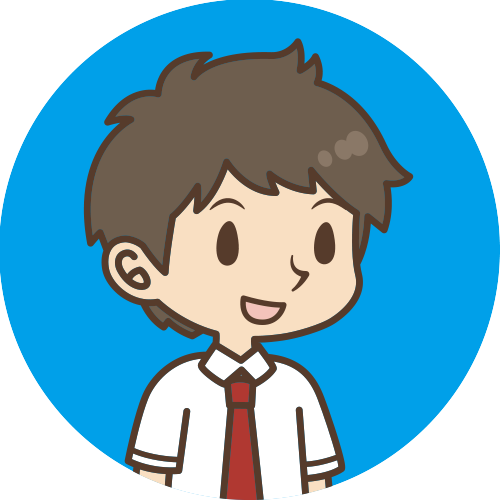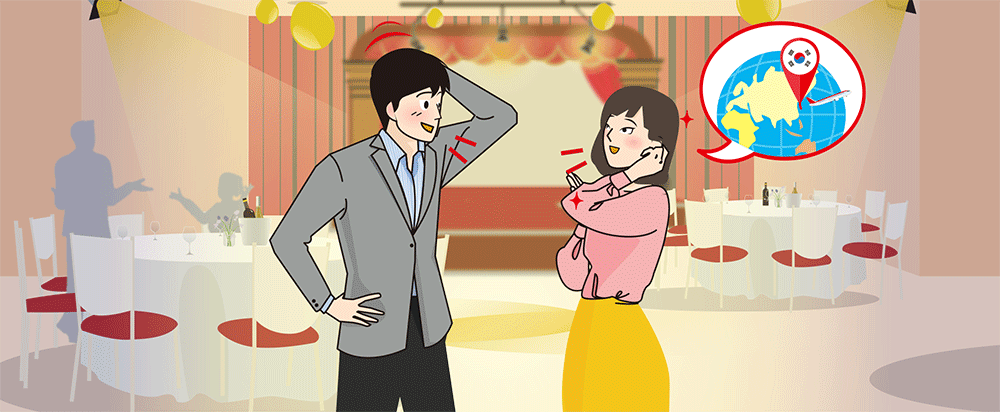Today's Point
今日のポイント会話ではWhere isをWhere’s、Where areをWhere’reと、通常、短縮して発音します。「今日のストーリー」にもWhere’s that?とあります。キーフレーズのWhere are you from?もWhere’re you from?と発音しますが、Where'sと異なり、Where’reと書くことはあまりありません。
なお、〈Where +do/does +主語+~?〉で、「主語はどこで~をしますか?」と尋ねる表現もあります。過去形はdidを用います。「今日のストーリー」に、Where did you grow up?があります。

「出身はどちらですか?」ジウと二人きりになったケンは、まずはジウの出身地を聞きました。
その後はお互いの勤務先や自宅の場所などを聞きあって、話が盛り上がっています。
さてさて、お互いにセブに来たばかりの二人のストーリーは、これからどうなっていくのでしょうか?

Story of the Day
今日のストーリーRepeat after your teacher.
先生の後に続けて言ってみましょう。
| Ken : Where are you from, Jiu? | ケン : 出身はどちらですか、ジウさん? |
|---|---|
| Jiu : I’m from Seoul, Korea. | ジウ : 韓国のソウルです。 |
| Ken : Is that your hometown? | ケン : そちらが出身地なのですか? |
| Jiu : No, I’m from a small village near Seoul. | ジウ : いえ、ソウルの近くの小さい村の出身です。 |
| Jiu : How about you? | ジウ : ケンさんは? |
| Jiu : Where did you grow up? | ジウ : どこで育ったのですか? |
| Ken : My hometown is in Yokohama, Japan. | ケン : 育った町は日本の横浜にあります。 |
| Jiu : Where’s that? | ジウ : それはどこにあるんですか? |
| Ken : It’s a city located just west of Tokyo. | ケン : 東京のちょっと西の方にある都市です。 |
| Jiu : That sounds cool. | ジウ : よさそうですね。 |
| Jiu : So, where is your office? | ジウ : で、オフィスはどこですか? |
| Ken : I work near Cebu IT Park. | ケン : セブITパークの近くで働いています。 |
| Jiu : I don’t know where that is. | ジウ : それがどこなのか知らないわ。 |
| Ken : It’s okay. | ケン : なかなかいいところですよ。 |
| Ken : So, do you live around here? | ケン : それで、この近くに住んでいるんですか? |
| Jiu : Yeah. I live near Mandani Bay. | ジウ : ええ、マンダニ湾の近くに住んでいます。 |
| Jiu : Do you know where that is? | ジウ : どこだかわかりますか? |
| Ken : I’m afraid not. | ケン : 残念ながらわかりません。 |
| Ken : We’re both new to Cebu! | ケン : ぼくら二人とも、セブに来て日が浅いですからね! |
Key Phrase
キーフレーズRepeat after your teacher.
先生の後に続けて言ってみましょう。
Where are you from?
Vocabulary / Expressions
ボキャブラリーと表現Repeat after your teacher.
先生の後に続けて言ってみましょう。
| village(名詞) | 村 |
|---|---|
| grow up | 成長する、大人になる |
| located(形容詞) | 位置して |
| sound cool | よさそう、カッコよさそう |
Exercise
エクササイズ ARead the conversation aloud with your teacher. Fill in the blanks with a, b and c.
After that, fill in the blanks with your own words and practice the conversation with your teacher.
下記の会話の空欄に、a, b, cそれぞれの言葉を入れて、先生と一緒に音読してみましょう。
そのあと、空欄に入る言葉を自分で考えて、先生と会話をしてみましょう。

| Ken : Where are you from, Jiu? | ケン : 出身はどちらですか、ジウさん? |
|---|---|
| Jiu : I’m from ________ (a. Osaka, Japan b. Beijing, China c. Sydney, Australia). | ジウ : (a. 日本の大阪 b. 中国の北京 c. オーストラリアのシドニー)です。 |
| Ken : Is that your hometown? | ケン : そちらが出身地なのですか? |
| Jiu :No, I’m from a small village ________ (a. near Osaka b. around Beijing c. close to Sydney). | ジウ : いえ、(a. 大阪の近くの b. 北京の周辺の c. シドニーのすぐ近くの)小さい村の出身です。 |
Exercise
エクササイズ B (Vocabulary Building)Choose the correct word from the box.
空欄に当てはまる言葉を選んで文章を完成させてください。
- village
- grow up
- located
- sounds cool
- Sapporo is __________in Hokkaido.
- There are about one hundred people living in this _______.
- A: I am now working for a big bank. B: That ________.
- My son will _______ in a safe area.
Exercise
エクササイズ CSituation : Talk about where you are from. Then ask where your friend is from.
ロールプレイ : 自分の出身地について述べてください。そして、友人にどちらの出身か聞いてください。


Extra Exercise
Try the Extra Exercises. As with Exercise A, become familiar with some of these more advanced phrases.
エクストラ・エクササイズに挑戦してみましょう。
エクササイズAと同じ要領で、より高度なフレーズを練習してみましょう。
| Ken: Where (a. were you born b. did you grow up c. are you from)? |
|---|
| Mike: I was born and raised in Taiwan. |
| Ken: Where in Taiwan? |
| Mike: Taipei. |
| Ken: Where is your (a. English school b. wife’s hometown c. office located)? |
| Mike: Is this some kind of interrogation? |
| Ken: No. I’m learning how to use the word “where.” |
| Mike: I see. So you’re practicing on me. |

- I was born and raised in Taiwan.は「私は台湾で生まれて、育ちました→生まれも育ちも台湾です」という意味。
- Soは文頭で用いると「つまり」という意味になります。
- practice on ~は「~に対して練習する→~を練習台にする」。他にも、Can I practice on you?「練習台になってもらえる?」のように使います。
- locatedは「(形容詞)位置して」、some kind of は「ある種の」「なんらかの」、interrogationは「尋問」「取り調べ」。